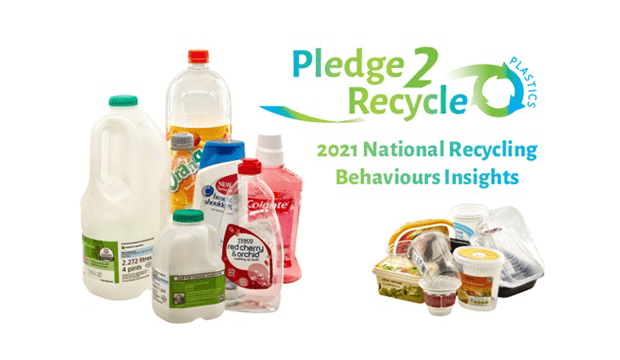
RECOUP Survey Highlights Need for Simplicity to Increase Consumer Recycling
Plastics recycling and resources charity RECOUP has published the results of its Pledge2Recyle study entitled ‘Citizen Plastics Recycling Behaviours Insights’, which explores how people recycle their plastic and if commonly shared guidelines are followed.
Hosted on the Pledge2Recycle website, the survey received over 6500 responses from across the UK, including devolved nations, resulting in one of the largest and most comprehensive studies of its kind.
The results indicate that 95% of citizens claim they recycle plastic drinks bottles every time. This drops to 83% with shampoo and conditioner bottles and 80% for cleaning products and sauce bottles. Claimed recycling rates drop considerably once the packs become more complicated, for example, when the packs are more difficult to clean or less likely to be collected kerbside. Only 52% of citizens claimed to recycle trays that had previously contained cooked food or ready meals. 62% of citizens claim to recycle fresh meat trays every time. This rose to 73% for clear fruit and veg clear trays.
Anne Hitch, Head of Citizen & Stakeholder Strategy at RECOUP, commented: “The picture painted of citizen plastics recycling behaviours is a complex one. Simplicity is the key to citizen engagement both in pack design and recycling messaging. Recycling needs to be intuitive both in terms of collection consistency, service provision, and pre-preparation of the pack. Convenience is paramount to unlocking the potential for higher plastics recycling rates.”
The work further indicates that there is confusion when a pack claims to be ‘recyclable’ when it is a non-target material for kerbside collection schemes. For example, the move towards mono-polymer toothpaste tubes has led to the tube being declared ‘recyclable’ when it is not collected by local authorities kerbside. There is a need for synergy across the value chain for items where technical recyclability claims cannot be matched by infrastructure, sorting, and capture capabilities. Work is needed to agree as to how this can be accurately relayed to citizens without causing even more confusion.
Even the simplest plastic pack (the drinks bottle) challenges remain in ensuring that citizens pre-prepare the pack in line with industry guidelines of empty, rinse, and lid on. Less than half of the citizens on the survey claim to recycle bottles this way (43%). This represents key losses to the industry in terms of recyclate that could easily be recycled with existing infrastructure if citizens understood the importance of the preparation instructions.
Whilst the full report is available to RECOUP members only and will be released into the open domain in early May 2022. An executive summary is available on the RECOUP website at www.recoup.org.
RECOUP’s Pledge2Recycle Plastics team is currently working with the 13 Kent Councils as a ‘Live Lab’, delivering and investigating how plastics recycling communications can result in the desired outcomes in plastics recycling behaviour change. The results of this project are due in the open domain in July 2022, with further activations scheduled to follow elsewhere in the UK.
Further information on the work of RECOUP and Pledge2Recycle Plastics can be found at www.recoup.org and www.pledge2recycle.co.uk. Alternatively, click here to read more news from RECOUP.
RECOUP
01733 390021
Website
Email





